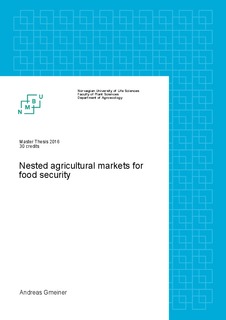Nested agricultural markets for food security
Master thesis
Permanent lenke
http://hdl.handle.net/11250/2443177Utgivelsesdato
2017-05-22Metadata
Vis full innførselSamlinger
- Master's theses (IPV) [240]
Sammendrag
Future agricultural systems have to provide more than just food. Agriculture plays a pivotal role in solving the ecological challenges which humanity is facing, and in combating poverty and food insecurity in many developing countries. Agroecological practices are very well suited to improve the ecological and environmental track record of agriculture. But how can agroecological practices help to increase the incomes and consequently improve food security of farmers in a developing country context?
To answer this question in regard to incomes from marketing products a multiple embedded case study in the Uluguru Mountains, Tanzania was conducted. Using interviews, observations and literature reviews, the study examined the available market infrastructure in four different market catchment areas to evaluate how this infrastructure is used and perceived by conventional and agroecological farmers.
The study shows that farmers have access to three different marketing channels: (1) the general market in form of formalized markets and farm-gate selling, (2) direct selling to final customers and (3) direct links to larger buyers or producers. In the four examined villages most agroecological farmers sell the majority of their products on the general market where their products are not differentiated from conventional products. Still, agroecological farmers in areas where agrochemicals are not available can increase their incomes by sustainably intensifying their production through agroecological practices without the need to access specific markets. On the contrary, in areas where the usage of fertilizers and pesticides is common, farmers need access to specific markets to profit financially from agroecological practices. Due to a structural lack of value chains for agroecological products, farmers also engage in constructing these themselves on a local level with mixed success.
Agroecological practices can help to increase incomes of farmers by increasing yields but also by providing better marketing conditions. To achieve the latter the introduction of agroecological practices has to be accompanied by the construction of new markets which value the quality of agroecological products differently.

